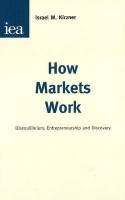How markets work
disequilibrium, entrepreneurship and discovery
- ISBN: 9780255366762
- Editorial: Institute of Economic Affairs
- Fecha de la edición: 2012
- Lugar de la edición: London. Reino Unido
- Colección: Hobart Paper
- Encuadernación: Rústica
- Medidas: 21 cm
- Nº Pág.: 81
- Idiomas: Inglés

Mainstream neo-classical economics focuses on already attained states of equilibrium. It is silent about the processes of adjustment to equilibrium; Human action consists of 'grappling with an essentially unknown future', not being confronted with clearly specified objectives, known resources and defined courses of action as mainstream theory assumes; Critics of the market economy find ammunition in neo-classical theory: they 'merely need to tick off the respects in which real world capitalism departs from the requirements for perfectly competitive optimality'; The theory of entrepreneurial discovery allows economists to escape from the 'analytical box' in which 'choice' simply consists of computing a solution implicit in given data; An entrepreneurial act of discovery consists in 'realising the existence of market value that has hitherto been overlooked'. Scope for entrepreneurial discovery occurs in a world of disequilibrium -- which is quite different from the equilibrium world of mainstream economics where market outcomes are foreordained; Entrepreneurial discovery explains why one price tends to prevail in a market. Though new causes of price differences continually appear, entrepreneurs exploit the resulting profit opportunities and produce a tendency towards a single price; Only with the introduction of entrepreneurship is it possible to appreciate how markets work. Without entrepreneurship, there would be no market co-ordination; So-called 'imperfections' of competition are often 'crucial elements in the market process of discovery and correction of earlier entrepreneurial errors'; Advertising expenditures, for example, are means of alerting consumers to 'what they do not know that they do not know'. Anti-trust laws may hamper market processes and prevent competitive entry to markets; so. Entrepreneurial profit, far from generating injustice, is a 'created gain'. It is not 'sliced from a pre-existing pie ...it is a portion which has been created in the very act of grasping it'.










